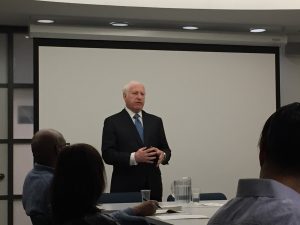New business model may make Illinois ‘Delaware of social enterprise’
February 12, 2017
Marc J. Lane, economic development expert and author, speaks at the Great Cities Institute at University of Illinois-Chicago Feb. 8. (Chronicle Media)
Illinois is becoming a hub for companies that want to change the world and make a profit at the same time, said Marc J. Lane, an attorney and economic development expert at an event hosted Feb. 8 by the Great Cities Institute at University of Illinois-Chicago.
Imagine a “Shark Tank” television show where non-profit charities bring their needs to cutthroat investment tycoons — and are funded immediately.
Lane described a business model that would help private companies with a mission to help solve social issues. He helped draft a new form of incorporation model called L3C for “social enterprise businesses.”
Lane, who authored “The Mission-Driven Venture: Business Solutions to the World’s Most Vexing Social Problems,” serves as Vice Chair of the Cook County Commission on Social Innovation. Lane was former chair of the state of Illinois Social Innovation Task Force under Gov. Pat Quinn.
The L3C model allows a charitable institution to branch off a for-profit business arm, or start a charitable business that focuses on solving social programs while still receiving tax benefits and the ability to receive donations from foundations and private investors.
Lane believes the L3C can “unlock $1 trillion in investor capital from institutional investors.”
So far, 10 states have approved incorporation as a “low-profit limited liability company” and about 1,500 businesses are incorporated in the U.S., including 240 organized in Illinois, according to the trade website “Intersector Partners L3C.”
About half of the L3Cs in the country are “freestanding businesses,” Lane said.
Lane believes that Illinois is ripe for bringing in new business opportunities that arise from solving social problems.
“[Illinois] wants to be the Delaware of social enterprise,” he said.
The first L3C company to incorporate in Illinois was Civic Staffing, L3C, which provides “temporary light industrial staffing.” The company guarantees fair treatment for low-skill workers in a business that is known for “wage theft, non-compliance with labor laws and ethical lapses,” according to its website.
Civic Staffing trains and employs disadvantaged workers recommended by 17 social service partners, including Catholic Charities, Easter Seals, Jewish Vocational Service, Instituto del Progreso Latino and The Heartland Alliance, said Bill Schwartz, chief operating officer, in an interview. The company is part of a nationwide group of ethical temp staffing providers called the Alternative Staffing Alliance.
Entrepreneurs who want to start such an endeavor have help in Cook County, Lane said. The county’s new commission is looking at “every aspect of the county’s assets, from public capital, intellectual capital, social capital, financial capital and human capital,” Lane said. The commission is looking at the Port of Chicago in the Lake Calumet area, for example.
“The port is an entrance to the Great Lakes, it’s underutilized and a missed opportunity. It could be an economic engine for the region.”
Lane said an active port region would bring jobs and possibly the opportunity for worker-owned businesses. The county’s commission is also looking for ways to create social enterprise businesses in partnership with the Cook County Land Bank.
Timothy Imokaparia, director of research and planning at Great Cities Institute, said social entrepreneur businesses had the potential to “foster a diverse ecosystem of entrepreneurial activity.”
Imokaparia and Lane discussed how to scale worker-owned services, such as Cleveland’s Evergreen Cooperative Initiative, which runs a green worker-owned laundry service for local hospitals and universities. The company’s mission is to employ low-skill workers from the inner city, to train workers in a shareholder model and to use green and sustainable cleaning processes.
Lane gave a brief timeline for social enterprise companies to build under the L3C incorporation model. The company would first secure investments from foundations, which are required to donate or invest 5 percent of their revenue every year.
“Foundations are the ideal investors with a long-term view and attached to the social mission,” he said.
The company can use the foundation capital as a means of leveraging to attract investors who seek “blended returns” from mission-based investing and ultimately institutional investors seeking predictable financial returns. Investors in these businesses are often “self-selected” because they believe in the mission, Lane said.
Lane said Cook County is brimming with opportunities for new social enterprise businesses, and he hopes the Commission on Social Innovation can help bring them to life.
The Cook County Commission on Social Innovation meets every third Thursday, Lane said. To follow the commission, visit www.cookcountymission.com.
Read the current issue of the Cook County Chronicle
Free subscription to the digital edition of the Cook County Chronicle
— New business model may make Illinois ‘Delaware of social enterprise’–



